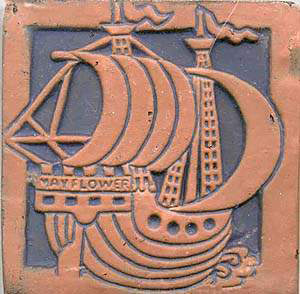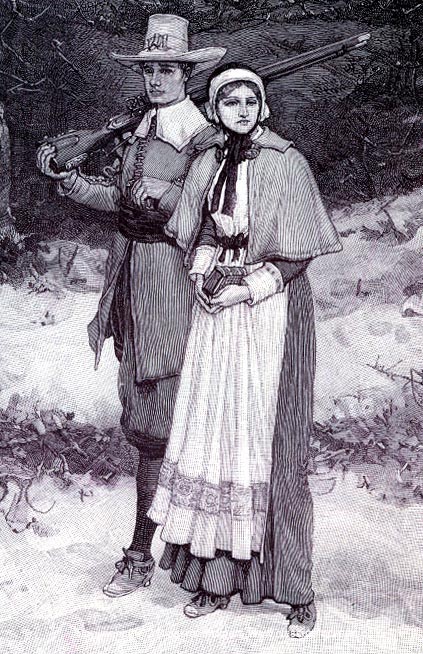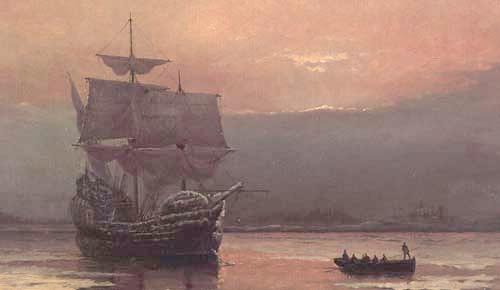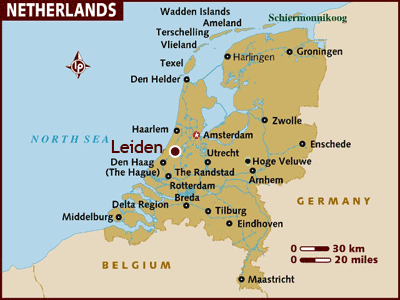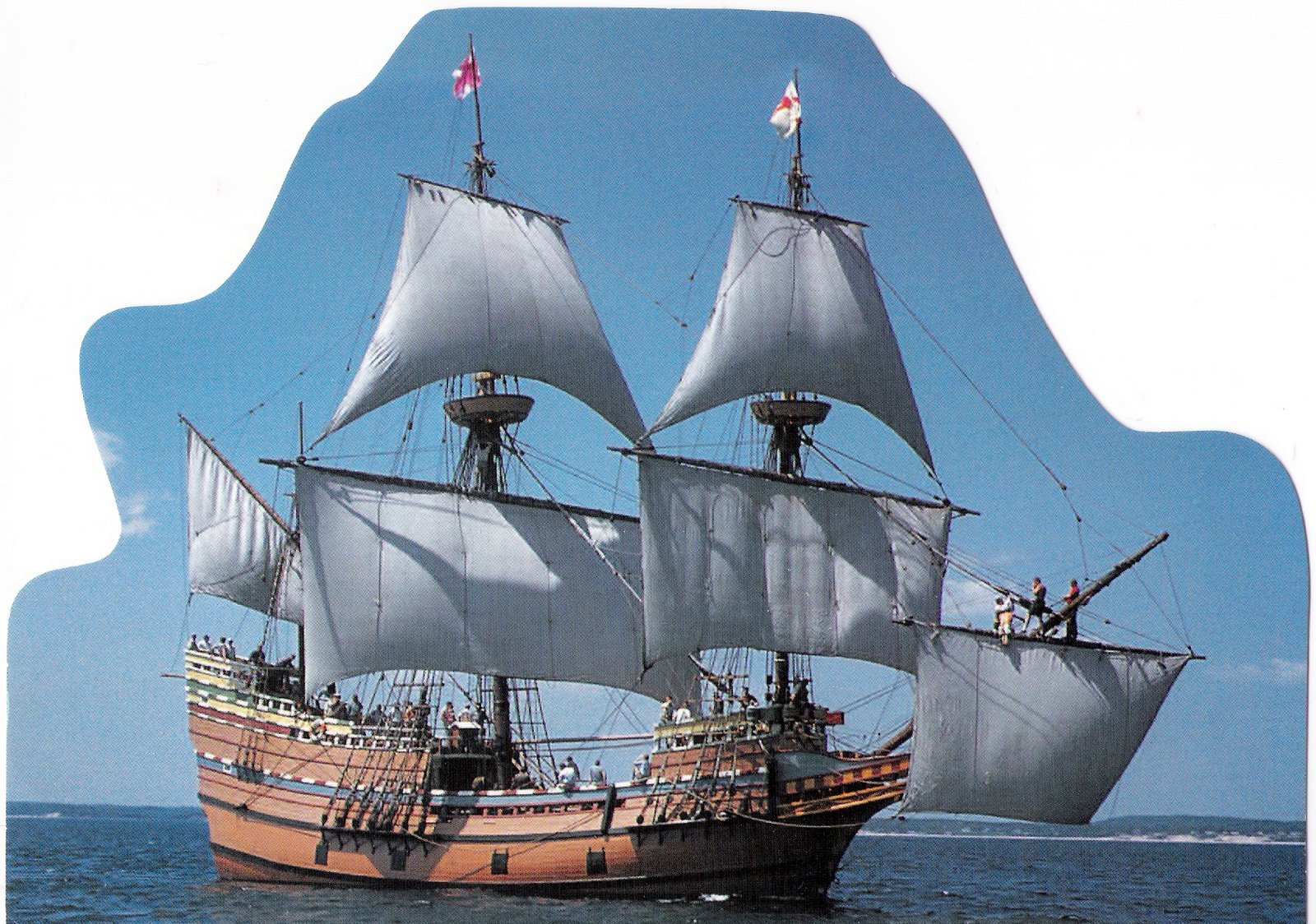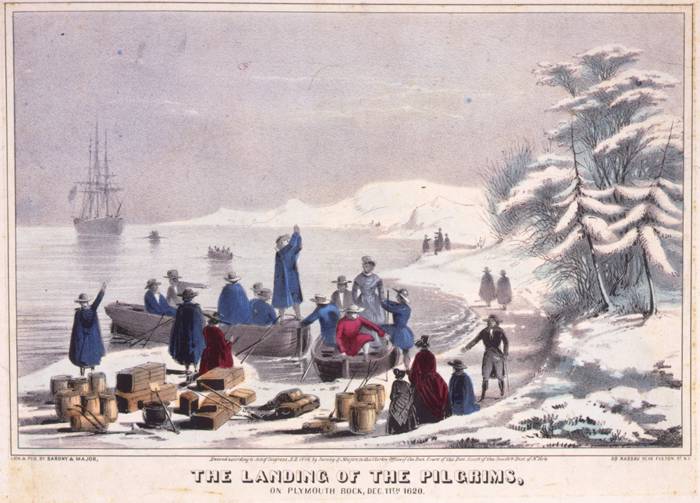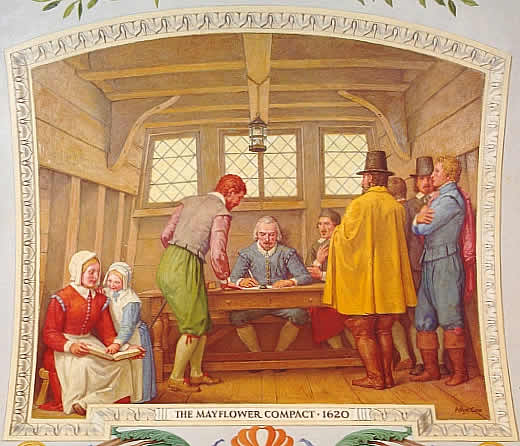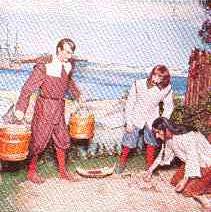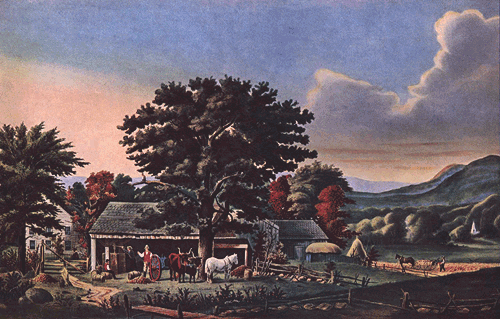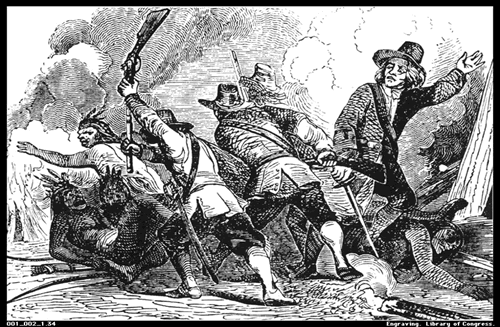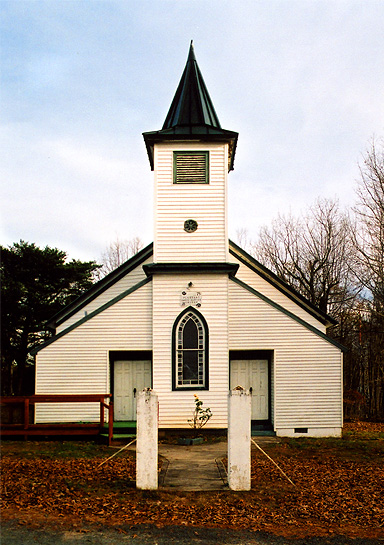|
|
Online Texts for Craig White's Literature Courses
|
|
Of Plymouth Plantation
(selections for LITR 4326 Early American Literature)
by William Bradford (1590-1657)
![]()
Instructor's notes: William Bradford was governor of Plymouth Plantation, the small community of "Pilgrims" who arrived in modern Massachusetts in 1619-20, a decade before the "Great Migration" of Puritans from England to Boston (further north in and around Boston).
Bradford's history of "the Pilgrims," written as a journal in the 1620s-1650s, was first published in 1856.
Purposes for reading: Bradford's text enjoys considerable prestige in American literature on account of its personal, stylistic, and historical qualities.
![]() Personal: Born to a modest family of farmers and orphaned at an
early age, Bradford was a sickly child who showed a precocious interest
in the Puritan religious movements in his neighboring countryside and a
particular devotion to learning. Even as he was put to work as a weaver,
he taught himself to read the Scriptures in their original languages of
Hebrew and Greek.
Personal: Born to a modest family of farmers and orphaned at an
early age, Bradford was a sickly child who showed a precocious interest
in the Puritan religious movements in his neighboring countryside and a
particular devotion to learning. Even as he was put to work as a weaver,
he taught himself to read the Scriptures in their original languages of
Hebrew and Greek.
Bradford could rise only so far above the prejudices of his own age, especially toward Catholics and Indians, but within those limits he appears to have been a man of remarkable integrity, as witnessed in the quality of his writing.
![]() Style:
Bradford's appeal to contemporary readers is limited by his genre of
community journal but more so by his dated English idiom. Bradford lived
in approximately the same time frame as Shakespeare and Milton, but his
language is less cosmopolitan or universal than theirs, as he spent most
of his life in a small community of working people whose main literary
influences were scriptures and religious tracts.
Style:
Bradford's appeal to contemporary readers is limited by his genre of
community journal but more so by his dated English idiom. Bradford lived
in approximately the same time frame as Shakespeare and Milton, but his
language is less cosmopolitan or universal than theirs, as he spent most
of his life in a small community of working people whose main literary
influences were scriptures and religious tracts.
![]() Historic: The great appeal of Bradford's journal is its
narrative tracing of a story familiar to centuries of American
immigrants, particularly
the arduous journey, the suffering on arrival, the eventual material
success, followed by dismay at the dispersal of the immigrant community.
Historic: The great appeal of Bradford's journal is its
narrative tracing of a story familiar to centuries of American
immigrants, particularly
the arduous journey, the suffering on arrival, the eventual material
success, followed by dismay at the dispersal of the immigrant community.
Bradford's journal is also of interest for sketching a variant on the immigrant narrative—the prevailing cultural narrative of the dominant culture, which arrives already speaking English and does not intend to assimilate to the pre-existing culture of North America. Rather, the dominant culture transplants and defends its native culture, expecting later immigrants to assimilate to their new dominant culture.
Discussion questions:
1. How does the Pilgrims' experience and identity exemplify the Anglo-American dominant culture that continues to characterize the USA?
2. How are American Indians represented? How much does Bradford absorb them into the dominant-culture narrative of the Pilgrims, and how and where do you get glimpses of their own story? (multiculturalism)
3. How does the immigrant narrative of expectation, suffering, success, and disappointment or learning appear in Bradford? How does this narrative appear in later American literature? (Consider other immigrant literature, The Great Gatsby, etc.)
|
|
|
Bradford's Of Plymouth Plantation
And first of the occasion and inducements thereunto [i.e., the reasons for the Pilgrims' coming to America; cf. origin story]; the which, that I may truly unfold, I must begin at the very root and rise [origin] of the same. The which I shall endeavor to manifest in a plain style, with singular regard unto the simple truth in all things; at least as near as my slender judgment can attain the same.
Chapter 1. Bradford’s history of the Protestant Reformation in England
[chapter 1, paragraph 1 > ¶1.1] It is well known unto the godly and judicious, how, ever since the first breaking out of the light of the gospel [Protestant Reformation] in our Honorable Nation of England, (which was the first of nations whom the Lord adorned therewith, after that gross darkness of popery [Catholicism] which had covered and overspread the Christian world,) what wars and oppositions ever since, Satan hath raised, maintained, and continued against the Saints, from time to time, in one sort or other. Sometimes by bloody death and cruel torments; other [times Satan inflicted] imprisonments, banishments, and other hard usages; as being loath [resistant] his [Satan’s] kingdom should go down, the truth prevail, and the churches of God revert to their ancient purity, and recover their primitive order, liberty, and beauty. [[Protestantism traditionally works to recover the original idea of the church comparable to the community Christ’s Apostles practiced in the Book of Acts; by implicit contrast, Catholicism adds to the history of the church—which, according to Protestants, would lead away from the light of divine revelation in the gospel and toward the darkness of human sinfulness.]
[¶1.2] But when he [Satan] could not prevail by these means, against the main truths of the gospel, but that they [truths] began to take root in many places, being watered with the blood of the martyrs, and blessed from heaven with a gracious increase; he then began to take him to his ancient stratagems, used of old against the first Christians [<again Bradford compares early Protestants to the original church of Christ's Apostles, here called "the first Christians." ]. . . .
![]()
|
Of Plymouth Plantation
Chapter 4. Showing the Reasons, and Causes of Their Removal |
|
Instructor’s note: In the early 1600s many of the Pilgrims, who were originally fromt he English midlands and were increasingly at odds with the state-sponsored Anglican Church, moved to the Netherlands (Holland), which guarantted religious freedom.
The Pilgrims' Dutch experiment was successful in many respects, but soon these English people became fearful of losing their separate identity. Particularly they saw their children wandering off from their special community. At risk of losing their unique status as a people of God, the Pilgrims decided not to assimilate to the modern Dutch culture that gave them freedom of worship. Instead, the Pilgrims moved again, this time to America, creating a unique immigrant story that becomes the prototype of the USA's dominant culture, in which assimilation to American Indian culture is not an option.
[chapter
4, paragraph 1a = ¶4.1a]
After they [the English
Pilgrims] had lived in this city
[Leiden, Holland] about some
eleven or twelve years (which is the more observable being the whole time of
that famous truce between that state and the Spaniards)
[Thirty Years’ War (1618-48) originating in
Protestant-Catholic divisions] and sundry
[various] of them
[Pilgrims] were taken away by
death and many others began to be well stricken in years (the grave mistress of
experience having taught them many things), those prudent governors
[the Pilgrims’ leaders] with
sundry of the sagest
[wisest] members began both deeply to apprehend their present dangers and wisely to foresee the future and
think of timely remedy. In the agitation of their thoughts, and much
discourse of things hereabout, at length they began to incline to this
conclusion: of removal to some other place. . . .
[¶4.5] Lastly (and which was not least), a great hope and inward zeal they had of laying some good foundation, or at least to make some way thereunto, for the propagating and advancing the gospel of the kingdom of Christ in those remote parts of the world [the Americas]; yea, though they should be but even as stepping-stones unto others for the performing of so great a work. [Bradford’s modesty in this ambition is accurate, as the first generations of Pilgrims and Puritans found little time or inclination for converting the American Indians.]
[¶4.7] The place they had thoughts on was some of those vast and unpeopled countries of America, which are fruitful and fit for habitation, being devoid of all civil inhabitants, where there are only savage and brutish men which range up and down, little otherwise than the wild beasts of the same. . . . [Bradford's description of America as "vast and unpeopled" anticipates later dominant-culture rationales for conquering American Indian territories; i.e. American Indians weren't numerous enough compared to the expanding European population to justify leaving the land without standard modern intensive development.]
![]()
|
Of Plymouth Plantation
Chapter Nine. Of Their Voyage, and How They Passed the Sea; and of Their Safe Arrival at Cape Cod |
|
[Instructor’s note: This chapter briefly describes the Pilgrims’ 65-day crossing of the Atlantic and their search for a proper area to settle, which eventually brings them to Cape Cod Bay in Massachusetts.]
[¶9.1] September 6 [1620]. These troubles being blown over, and now all being compact together in one ship, they put to sea again with a prosperous wind, which continued divers [several] days together, which was some encouragement unto them; yet, according to the usual manner, many were afflicted with seasickness.
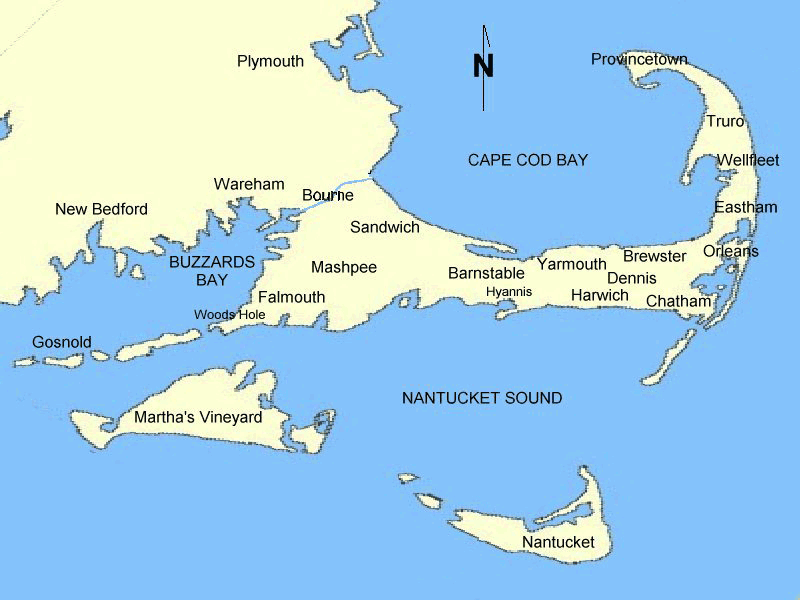 map of Cape Cod, Massachusetts, with Plymouth on Bay (Boston is further North) |
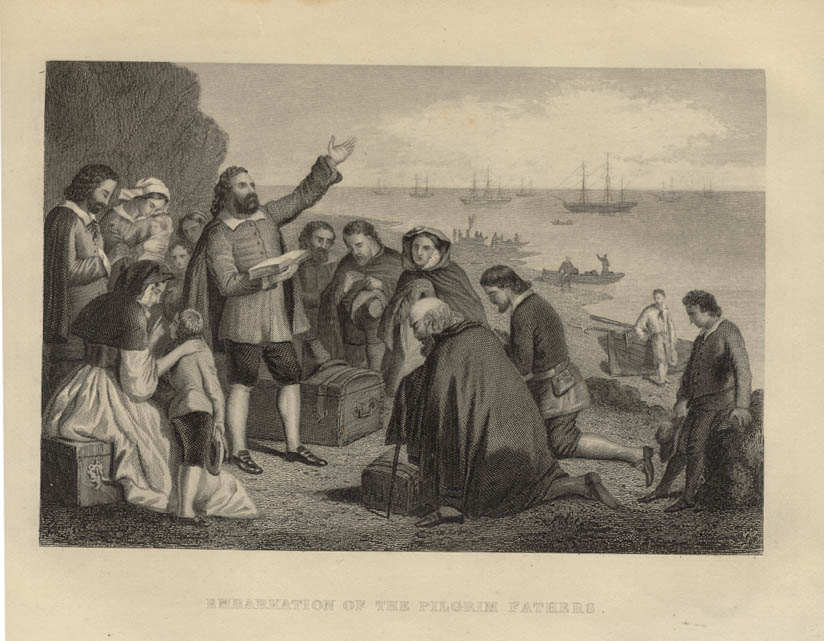 "Embarkation of the Pilgrim Fathers" |
[¶9.4] But to omit other things (that I may be brief) after long beating [navigation] at sea they fell with that land which is called Cape Cod . . . . [map above]
[¶9.5] Being thus arrived in a good harbor, and brought safe to land, they fell upon their knees and blessed the God of heaven who had brought them over the vast and furious ocean, and delivered them from all the perils and miseries thereof, again to set their feet on the firm and stable earth, their proper element. And no marvel if they were thus joyful, seeing wise Seneca [Roman philosopher] was so affected with sailing a few miles on the coast of his own Italy, as he affirmed, that he had rather remain twenty years on his way by land than pass by sea to any place in a short time, so tedious and dreadful was the same unto him. [Note that Bradford cites not only biblical scripture but secular classical sources like the Roman philosopher Seneca, an example of the “Christian Humanism” of the Renaissance and early Reformation.]
[¶9.6] But here I cannot but stay and make a pause, and stand half amazed at this poor people's present condition; and so I think will the reader, too, when he well considers the same. Being thus passed the vast ocean, and a sea of troubles before in their preparation (as may be remembered by that which went before), they had now no friends to welcome them nor inns to entertain or refresh their weatherbeaten bodies; no houses or much less towns to repair to, to seek for succor [aid, help, assistance].
[¶9.7] It is recorded in Scripture [Acts 28.2, where St. Paul is shipwrecked on Mediterranean Island of Malta] as a mercy to the Apostle and his shipwrecked company that the barbarians showed them no small kindness in refreshing them, but these savage barbarians [American Indians], when they met with them (as after will appear) were readier to fill their sides full of arrows than otherwise. And for the season it was winter, and they that know the winters of that country [New England] know them to be sharp and violent, and subject to cruel and fierce storms, dangerous to travel to known places, much more to search an unknown coast.
[¶9.8] Besides, what could they see but a hideous and desolate wilderness, full of wild beasts and wild men and what multitudes there might be of them they knew not. . . . [one of Bradford's most famous and often-quoted phrases, "hideous and desolate wilderness" anticipates the Romantic sublime, while the equation of "wild beasts and wild men" exposes the vast cultural gulf between the Pilgrims' idea of the human place in the world and their idea of the Indians as people without any human culture or civilization.]
[¶9.9]; for which way soever they turned their eyes (save upward to the heavens) they could have little solace or content in respect of any outward objects. For summer being done, all things stand upon them with a weatherbeaten face, and the whole country, full of woods and thickets, represented a wild and savage hue. If they looked behind them, there was the mighty ocean which they had passed and was now as a main bar and gulf to separate them from all the civil parts of the world. [In this passage, Bradford anticipates many immigrant narratives of later American literature and history, in which the length and difficulties of the immigrant journey suggest a total commitment to a new identity with little or no hope of returning to one's original nation. (This immigrant expectation of being cut off from one's native country has changed in recent decades with improved communications, faster transportation, and increasing numbers of immigrants from nearer countries in the Western Hemisphere.)]
[¶9.11] What could now sustain them but the Spirit of God and his grace? May not and ought not the children of these fathers rightly say:
Our fathers were Englishmen which came over this great ocean, and were ready to perish in this wilderness; but they cried unto the Lord, and he heard their voice and looked on their adversity, etc. Let them therefore praise the Lord, because he is good: and his mercies endure forever. Yea, let them which have been redeemed of the Lord, show how he hath delivered them from the hand of the oppressor. When they wandered in the desert wilderness out of the way, and found no city to dwell in, both hungry and thirsty, their soul was overwhelmed in them. Let them confess before the Lord his lovingkindness and his wonderful works before the sons of men.
[Instructor's note: Bradford's reference to "the children of these fathers" shows his (successful) attempt to write the Pilgrims into the later history that later generations would learn as defining the English immigration to America.]
![]()
|
Of Plymouth Plantation
Chapter Ten. Showing How They Sought Out a Place of Habitation, and What Befell Them Thereabout |
|
[¶10.1] Being thus arrived at Cape Cod the 11th of November [1620], and necessity calling them to look out a place for habitation . . . ; they having brought a large shallop [small open boat for shallow waters] with them out of England, stowed in quarters in the ship, they now got her out and set their carpenters to work to trim her up; but being much bruised and shattered in the ship with foul weather, they saw she would be long in mending.
[¶10.2] Whereupon a few of them tendered themselves to go by land and discover [explore] those nearest places . . . . [T]hey were permitted to go, being sixteen of them well-armed under the conduct of Captain Standish [Myles Standish (1584-1656), military advisor hired by the Pilgrims], having such instructions given them as was thought meet [appropriate]. They set forth [on] the 15th of November; and when they had marched about the space of a mile by the seaside, they espied five or six persons with a dog coming towards them, who were savages; but they [the “savages”] fled from them [the English] and ran up into the woods, and the English followed them, partly to see if they could speak with them, and partly to discover if there might not be more of them lying in ambush. But the Indians seeing themselves thus followed, they again forsook the woods and ran away on the sands as hard as they could, so as they could not come near them but followed them by the track of their feet sundry miles and saw that they had come the same way. So, night coming on, they made their rendezvous and set out their sentinels [guards], and rested in quiet that night; and the next morning followed their track till they had headed a great creek and so left the sands, and turned another way into the woods. . . .
[¶10.3] Afterwards they directed their course to come to the other shore, for they knew it was a neck of land they were to cross over, and so at length got to the seaside and marched to this supposed river, and by the way found a pond of clear, fresh water, and shortly after a good quantity of clear ground where the Indians had formerly set corn, and some of their graves.
[The first evidence of the 1612-1617 epidemic of European disease that killed up to 90% of the Massachusett Indians just before the Pilgrims' arrival.]
[¶10.4] And proceeding further they saw new stubble where corn had been set the same year; also they found where lately a house had been, where some planks and a great kettle was remaining, and heaps of sand newly paddled with their hands. Which, they digging up, found in them divers fair Indian baskets filled with corn, and some in ears, fair and good, of divers [various] colors, which seemed to them a very goodly sight (having never seen any such before).
[¶10.6] After this, the shallop [small boat] being got ready, they set out again for the better discovery of this place, and the master of the ship desired to go himself. So there went some thirty men but found it to be no harbor for ships but only for boats. There was also found two of their [Indians'] houses covered with mats, and sundry of their implements in them, but the people were run away and could not be seen. Also there was found more of their corn and of their beans of various colors; the corn and beans they brought away, purposing to give them full satisfaction [repay] when they should meet with any of them as, about some six months afterward they did, to their good content.
[¶10.7] And here is to be noted a special providence of God, and a great mercy to this poor people, that here they got seed to plant them corn the next year, or else they might have starved, for they had none nor any likelihood to get any till the season had been past, as the sequel did manifest. Neither it is likely they had had this, if the first voyage had not been made, for the ground was now all covered with snow and hard frozen; but the Lord is never wanting unto His in their greatest needs; let His holy name have all the praise.
[Instructor’s note: The Pilgrims’ interpretation of the New World of America as a Promised Land overflowing with blessings thanks to their special relation with God is automatically agreeable to the USA’s evangelical dominant culture. With no disrespect to anyone's scripture or faith, keep in mind how much this interpretation of events blocks any reception of the Indians' catastrophic story resulting from contact with European viruses, which neither the Europeans or the Indians then understood.]
[¶10.8] The month of November being spent in these affairs, and much foul weather falling in, the 6th of December they sent out their shallop again with ten of their principal men and some seamen, upon further discovery [exploration], intending to circulate that deep bay of Cape Cod. The weather [precipitation or rain] was very cold and it froze so hard as the spray of the sea lighting on their coats, they were as if they had been glazed. [Bradford was a sometime poet] . . .
[¶10.13] But presently, all on the sudden, they heard a great and strange cry, which they knew to be the same voices they heard in the night, though they varied their notes; and one of their company being abroad came running in and cried, "Men, Indians! Indians!" And withal, their arrows came flying amongst them.
[¶10.14] Their [the Pilgrims’] men ran with all speed to recover their arms [weapons], as by the good providence of God they did. In the meantime, of those that were there ready, two muskets were discharged at them, and two more stood ready in the entrance of their rendezvous but were commanded not to shoot till they could take full aim at them. And the other two [muskets] charged [loaded] again with all speed, for there were only four had arms there, and defended the barricade, which was first assaulted.
[¶10.15] The cry of the Indians was dreadful, especially when they saw the men run out of the rendezvous toward the shallop to recover their arms, the Indians wheeling about upon them. But some running out with coats of mail on, and cutlasses in their hands, they soon got their arms and let fly amongst them and quickly stopped their violence. Yet there was a lusty [strong] man, and no less valiant, stood behind a tree within half a musket shot, and let his arrows fly at them; he was seen [to] shoot three arrows, which were all avoided. He stood three shots of a musket, till one taking full aim at him and made the bark or splinters of the tree fly about his ears, after which he gave an extraordinary shriek and away they [the Indians] went, all of them. They [the Pilgrims] left some to keep the shallop and followed them about a quarter of a mile and shouted once or twice, and shot off two or three pieces, and so returned. This they did that they [the Indians] might conceive that they [the Pilgrims] were not afraid of them [the Indians] or any way discouraged.
![]()
|
Of Plymouth Plantation
from Chapter Eleven. The remainder of Anno 1620. [Mayflower Compact; Squanto; the Starving Time] |
|
Instructor’s note:
![]() The Mayflower Compact is treasured
by American historians as a prototype or preview of the USA’s
Declaration
and Constitution 150 years later. Both sets of documents establish a system
of laws and a
social contract governed by majority rule
The Mayflower Compact is treasured
by American historians as a prototype or preview of the USA’s
Declaration
and Constitution 150 years later. Both sets of documents establish a system
of laws and a
social contract governed by majority rule
![]() “Covenant,” a concept inherited
from the relationship of Yahweh and the Jewish people, is the essential
"social contract" by which the Pilgrims combine religious devotion and civil
government.
“Covenant,” a concept inherited
from the relationship of Yahweh and the Jewish people, is the essential
"social contract" by which the Pilgrims combine religious devotion and civil
government.
![]() Historical background and theme: As
the opening paragraph indicates, the Pilgrims' land patent or title (from
the London Virginia Company) was for Virginia to the south. The reference
also indicates the difficulty of controlling new
inhabitants in land where the native culture has little authority—cf. other
colonial situations in Asia, Africa, the Middle East.
Historical background and theme: As
the opening paragraph indicates, the Pilgrims' land patent or title (from
the London Virginia Company) was for Virginia to the south. The reference
also indicates the difficulty of controlling new
inhabitants in land where the native culture has little authority—cf. other
colonial situations in Asia, Africa, the Middle East.
![]() Typology:
When the ancient Jews journeyed to the Promised
Land, they brought their own rules with them, ignoring the culture of the
established inhabitants (the Canaanites). Comparably, when the Pilgrims come to
America, they ignore the Indians’ way of life as “savage” and irrelevant. By
extension, the Pilgrims' narrative of immigration differs from the standard
immigrant narrative because the Pilgrims have no intention of
assimilating to the
pre-existing culture of the Indians.
Typology:
When the ancient Jews journeyed to the Promised
Land, they brought their own rules with them, ignoring the culture of the
established inhabitants (the Canaanites). Comparably, when the Pilgrims come to
America, they ignore the Indians’ way of life as “savage” and irrelevant. By
extension, the Pilgrims' narrative of immigration differs from the standard
immigrant narrative because the Pilgrims have no intention of
assimilating to the
pre-existing culture of the Indians.
![]() The Indian Samoset, who speaks some English, appears and
introduces Squanto, who had lived with his tribe on the land the Pilgrims
now occupy but had been kidnapped and taken to Europe, only to escape and
return to Massachusetts. While Squanto was in Europe, however,
all his
people had been killed by the epidemics of the late 1610s, leaving the land
that the Pilgrims occupied empty.
The Indian Samoset, who speaks some English, appears and
introduces Squanto, who had lived with his tribe on the land the Pilgrims
now occupy but had been kidnapped and taken to Europe, only to escape and
return to Massachusetts. While Squanto was in Europe, however,
all his
people had been killed by the epidemics of the late 1610s, leaving the land
that the Pilgrims occupied empty.
from Chapter Eleven. The remainder of Anno 1620.
[¶11.1] I shall a little return back and begin with a combination [contract or covenant] made by them before they came ashore, being the first foundation of their government in this place; occasioned partly by the discontented and mutinous speeches that some of the strangers [non-Pilgrims] amongst them had let fall from them in the ship—That when they came ashore they would *use their own liberty; for none had power to command them*, the patent they had being for Virginia, and not for New England, which belonged to another Government, with which the Virginia Company had nothing to do. And partly that such an act by them done (this their condition considered) might be as firm as any patent [official document], and in some respects more sure. [*compare "use their own liberty, for none had power to command them" to the "each one should do the best he could to save himself" moment in Cabeza de Vaca, para. 61, exemplifying the American dilemma of "a community of individuals."]
[¶11.2] The form was as followeth. ["The Mayflower Compact"]
IN THE NAME OF GOD, AMEN. We, whose names are underwritten, the Loyal Subjects of our dread Sovereign Lord King James, by the Grace of God, of Great Britain, France, and Ireland, King, Defender of the Faith, &c. Having undertaken for the Glory of God, and Advancement of the Christian Faith, and the Honor of our King and Country, a Voyage to plant the first Colony in the northern Parts of Virginia [New England]; Do by these Presents, solemnly and mutually, in the Presence of God and one another, covenant and combine ourselves together into a civil Body Politick, for our better Ordering and Preservation, and Furtherance of the Ends aforesaid: And by Virtue hereof do enact, constitute, and frame, such just and equal Laws, Ordinances, Acts, Constitutions, and Officers, from time to time, as shall be thought most meet and convenient for the general Good of the Colony; unto which we promise all due Submission and Obedience. IN WITNESS whereof we have hereunto subscribed our names at Cape Cod the eleventh of November, in the Reign of our Sovereign Lord King James, of England, France, and Ireland, the eighteenth, and of Scotland the fifty-fourth, Anno Domini; 1620.
[50 signatures follow, including Bradford's]
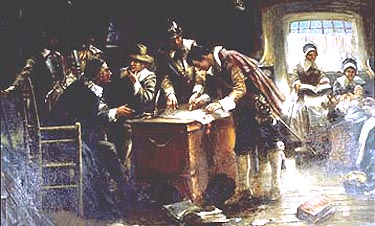
artist's rendering of signing of Mayflower
Compact
[¶11.3] After this they chose, or rather confirmed, Mr. John Carver (a man godly and well approved amongst them) their Governor for that year. And after they had provided a place for their goods, or common store, (which were long in unlading [unloading] for want of boats, foulness of winter weather, and sickness of diverse,) and begun some small cottages for their habitation, as time would admit, they met and consulted of laws and orders, both for their civil and military Government, as the necessity of their condition did require, still adding thereunto as urgent occasion in several times, and as cases did require. [contrast the Pilgrims’ inclination to meet and maintain a community with the individualistic, anti-government attitudes of other tribes of America's later dominant culture.]
[The next paragraph (¶11.4) describes “the starving time” of the Pilgrims' first winter, in which nearly half of the 102 Pilgrims perished. More positively, Bradford describes the ordeal as one in which individuals sacrifice for the community—an event he seems to remember when he later regrets the community’s dispersal.]
[¶11.4] In these hard and difficult beginnings they found some discontents and murmurings arise amongst some, and mutinous speeches and carriages [behaviors] in other; but they were soon quelled and overcome by the wisdom, patience, and just and equal carriage [bearing] of things by the Governor and better part, which clave [cohered, clung] faithfully together in the main. But that which was most sad and lamentable was, that in two or three months time, half of their company died, especially in January and February, being the depth of winter, and wanting houses and other comforts; being infected with the scurvy [disease typical on long sea voyages resulting from lack of vitamin C] and other diseases, which this long voyage and their inaccomodate [inhospitable] condition had brought upon them; so as there died some times two or three [persons] a day, in the foresaid time; that of 100-odd persons, scarce 50 remained.
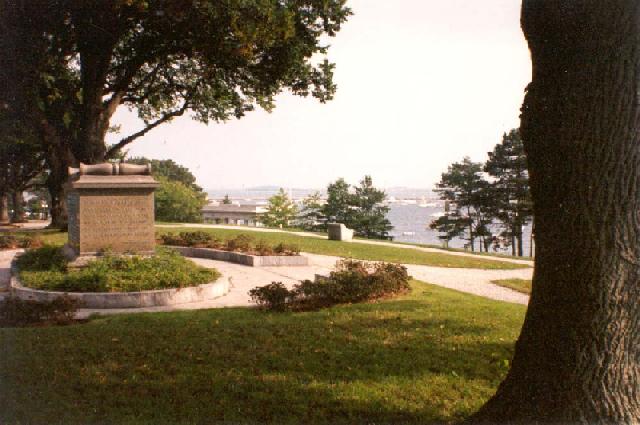
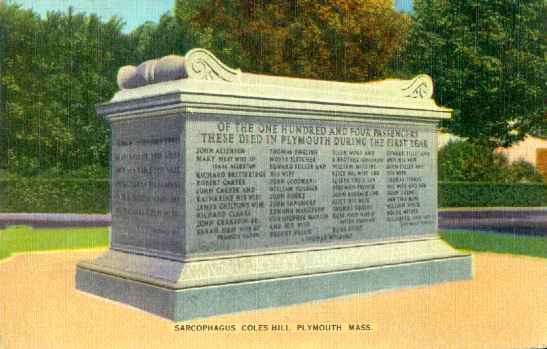
On Cole's
Hill overlooking
[¶11.5] And of these in the time of most distress, there was but six or seven sound persons, who, to their great commendations be it spoken, spared no pains, night nor day, but with abundance of toil and hazard of their own health, fetched them wood, made them fires, dressed [prepared] them meat, made their beds, washed their loathsome [soiled] clothes, clothed and unclothed them [the sick]; in a word, did all the homely and necessary offices for them which dainty and queasy stomachs cannot endure to hear named; and all this willingly and cheerfully, without any grudging in the least, showing herein their true love unto their friends and brethren. A rare example and worthy to be remembered. Two of these seven were Mr. William Brewster, their reverend Elder, and Myles Standish, their Captain and military commander, unto whom myself, and many others, were much beholden in our low and sick condition. And yet the Lord so upheld these persons, as in this general calamity they were not at all infected either with sickness, or lameness. And what I have said of these, I may say of many others who died in this general visitation, and others yet living, that whilst they had health, yea, or any strength continuing, they were not wanting to any that had need of them. And I doubt not but their recompense is with the Lord.
[typology: Just as Bradford remembers the Jews of the Exodus story as “example(s) . . . worthy to be remembered,” in the paragraph above he describes the first settlers as a type for emulation or imitation, especially in contrast to the "strangers" or non-Separatists described in the next paragraph.]
[¶11.6] But I may not here pass by another remarkable passage not to be forgotten. As this calamity fell among the passengers that were to be left here to plant, and were hasted ashore and made to drink water*, that the sea-men might have the more beer* and one in his sickness desiring but a small can of beer, it was answered, that if he were their own father he should have none; the disease began to fall amongst them [the sea-men] also, so as almost half of their company died before they went away, and many of their officers and lustiest [most robust] men, as the boatswain, gunner, quarter-masters, the cook, and others. At which the master was something stricken and sent to the sick a shore and told the Governor he should send for beer* for them that had need of it, though he drink water* homeward bound. [*at the time, beer would have been far safer to drink than water.]
[Instructor's note: the following 3 parts of ¶11.7 have some of the qualities of fiction and are among the most interesting and readable in Bradford's text. Why? What qualities of fiction are present?]
[¶11.7] But now amongst his company [the ships' sailors] there was far another kind of carriage [behavior] in this misery than amongst the passengers [the Pilgrims]; for they [the sailors and non-Pilgrims] that before had been boon companions in drinking and jollity in the time of their health and welfare, began now to desert one another in this calamity, saying they would not hazard [risk] their lives for them, they should be infected by coming to help them in their cabins, and so, after they came to die by it, would do little or nothing for them, but if they died let them die.
[¶11.7a] But such of the passengers [Pilgrims] as were yet aboard showed them what mercy they could, which made some of their hearts relent, as the boatswain (and some others), who was a proud young man, and would often curse and scoff at the passengers; but when he grew weak, they had compassion on him and helped him; then he confessed he did not deserve it at their hands, he had abused them in word and deed. 0! saith he, you, I now see, show your love like Christians indeed one to another, but we let one another lie and die like dogs.
[¶11.7b] Another lay cursing his wife, saying if it had not been for her he had never come this unlucky voyage, and anon [next] cursing his fellows, saying he had done this and that, for some of them, he had spent so much, and so much, amongst them, and they were now weary of him, and did not help him, having need. Another gave his companion all he had, if he died, to help him in his weakness; he went and got a little spice and made him a mess of meat once or twice, and because he died not so soon as he expected, he went amongst his fellows, and swore the rogue would cozen [trick] him, he would see him choked before he made him any more meat; and yet the poor fellow died before morning.
[¶11.8] All this while the Indians carne skulking [sneaking] about them, and would sometimes show themselves aloof [remote, unapproachable] off, but when any approached near them, they would run away. And once they stole away their [the Pilgrims’] tools where they had been at work, and were gone to dinner.
But about the sixteenth of March a certain Indian came boldly amongst them, and spoke to them in broken English, which they could well understand, but marveled at it. At length they understood by discourse with him, that he was not of these parts, but belonged to the eastern parts, where some English-ships came to fish, with whom he was acquainted, and could name sundry of them by their names, amongst whom he had got his language. He became profitable to them in acquainting them with many things concerning the state of the country in the east-parts where he lived, which was afterwards profitable unto them; as also of the people here, of their names, number, and strength; of their situation and distance from this place, and who was chief amongst them.
Samoset greeting Pilgrims;
postcard of
statue of Massasoit (1581-1661),
leader of Pokanoket tribe and Wampanoag Confederacy
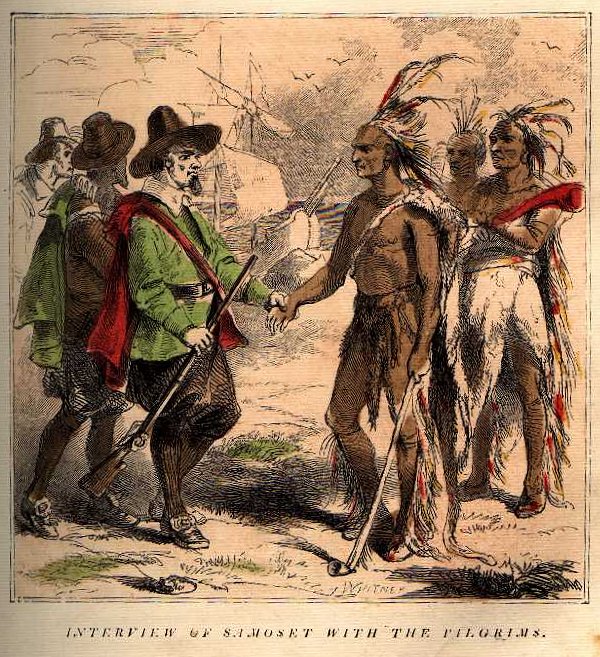 |
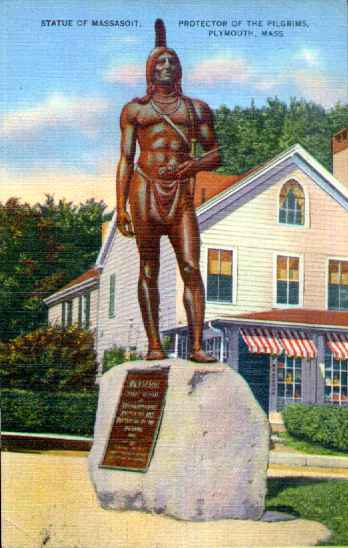 |
[¶11.9] His name was Samoset; he told them also of another Indian whose name was Squanto, a native of this place, who had been in England and could speak better English than himself. Being, after some time of entertainment and gifts, dismissed, a while after he carne again, and five more with him, and they brought again all the tools that were stolen away before, and made way for the coming of their great Sachem [chief, tribal leader], called Massasoit; who, about four or five days after, carne with the chief of his friends and other attendance, with the aforesaid Squanto.
. . . [¶11.11] After these things he [Samoset] returned to his place called Sowams, some 40 miles from this place, but Squanto continued with them, and was their interpreter, and was a special instrument sent of God for their good beyond their expectation. He directed them how to set their corn, where to take fish, and to procure other commodities, and was also their pilot to bring them to unknown places for their profit, and never left them till he died. He was a native of this place, and scarce any left alive beside himself.*
[*“scarce any left alive beside himself”: Another reference to the epidemic that devastated the Indians in the years before the Pilgrims' arrival. Squanto grew up among the Patuxet people who lived where the Pilgrims settled. In 1605, a few years before the epidemic, Squanto was kidnapped twice by European explorers. By the time he returned to his homeland in 1619, all his people were dead or dispersed. The Pilgrims settled the same area the following year, 1620. Squanto’s desire to live in his homeland confirms a contrast observed between Western or modern peoples like the Pilgrims and local or traditional peoples like American Indians. Whereas the early-modern Pilgrims keep moving and changing in search of a promised land, Indians and other traditional peoples assume they already live in a promised land.]
[¶11.12] He was carried away with diverse others by one Hunt, a master of a ship, who thought to sell them for slaves in Spain; but he got away for England, and was entertained by a merchant in London, and employed to Newfoundland and other parts, and lastly brought hither into these parts by one Mr. Dermer, a gentleman employed by Sir Ferdinando Gorges and others, for discovery, and other designs in these parts. . . .
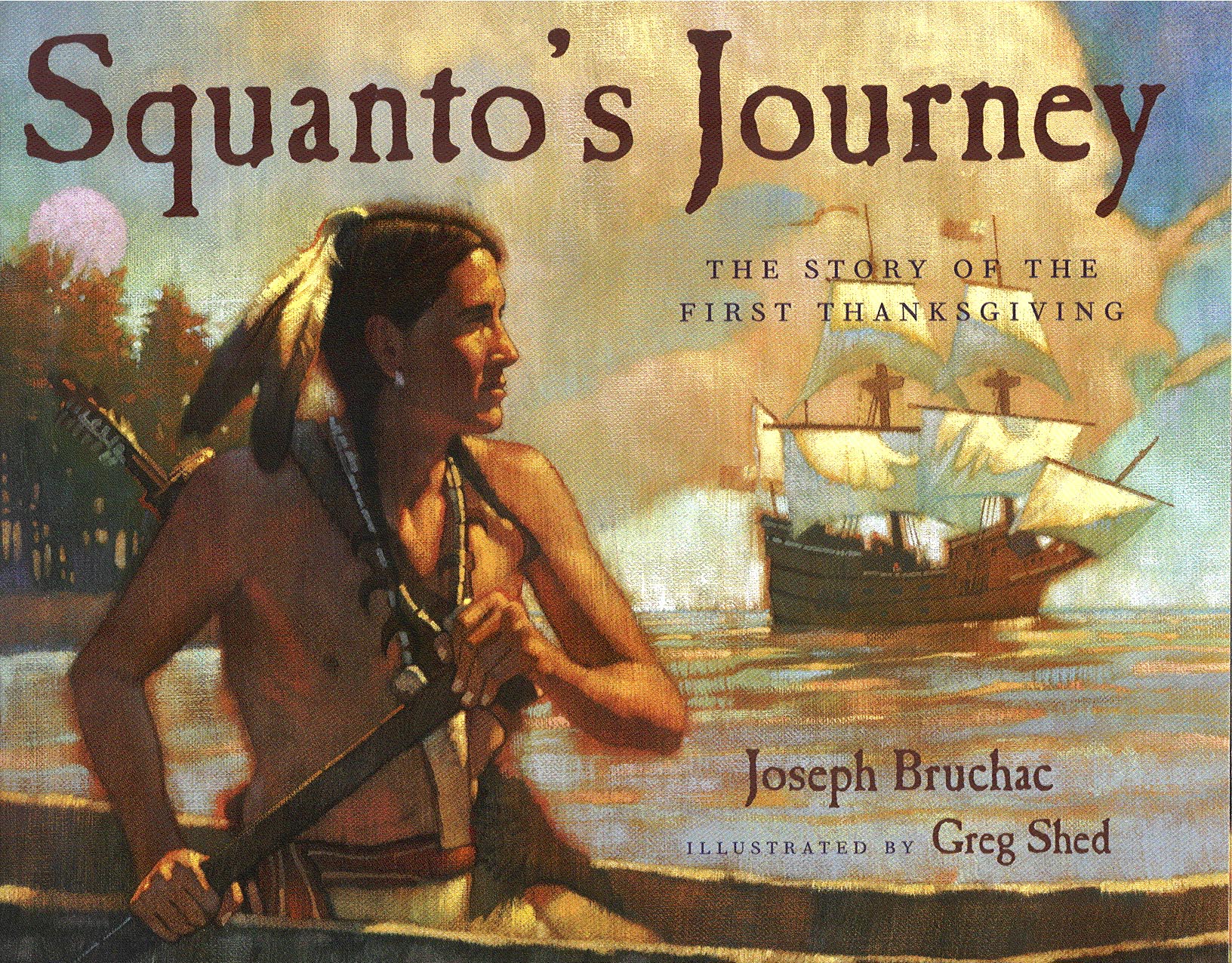
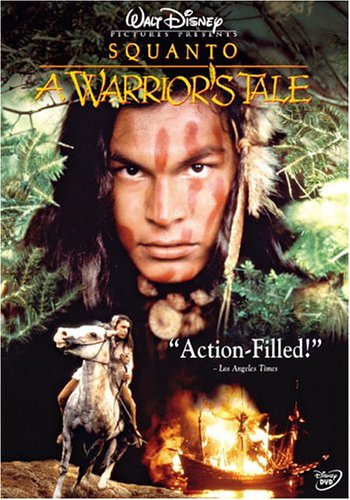
recent popularizations of
Squanto's story
[¶11.13] But to return. The spring approaching, it pleased God the mortality [deadly disease] began to cease amongst them, and the sick and lame recovered apace, which put as it were new life into them [the Pilgrims' community]; though they had borne their sad affliction with much patience and contentedness, as I think any people could do. But it was the Lord which upheld them, and had beforehand prepared them; many having long borne the yoke, yea from their youth. Many other smaller matters I omit, sundry of them having been already published in a journal [Mourt’s Relation] made by one of the company and some other passages of journeys and relations already published, to which I refer those that are willing to know them more particularly. And being now come to the 25th of March I shall begin the year 1621.
![]()
|
Of Plymouth Plantation
from Chapter Twelve. [The Mayflower returns; Indian relations; the first Thanksgiving] |
|
Anno 1621
[¶12.2] Afterwards they [the Pilgrims] (as many as were able) began to plant their corn, in which service Squanto stood them in great stead, showing them both the manner how to set it, and after how to dress and tend it. Also he told them except [unless] they got fish and set with it (in these old grounds) it would come to nothing, and he showed them that in the middle of April they should have store enough come up the brook, by which they began to build, and taught them how to take it, and where to get other provisions necessary for them; all which they found true by trial and experience. Some English seed they sewed, as wheat and peas, but it came not to good, either by the badness of the seed, or lateness of the season, or both, or some other defect. . . .
![]()
[Popular art depicting "First Thanksgiving" as moment of unity b/w Pilgrims and Indians]
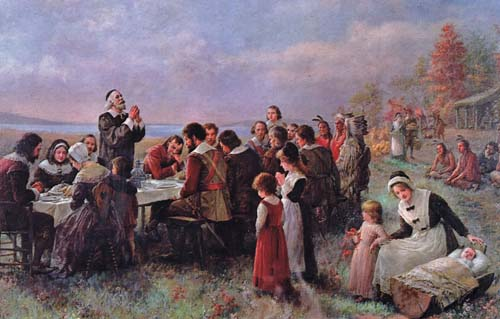 |
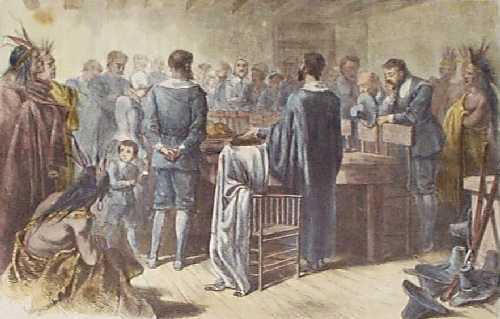 |
[Instructor’s note: Bradford's is one of two accounts of the First Thanksgiving—see the second immediately below Bradford's.]
[¶12.12] They [Pilgrims] began now to gather in the small harvest they had, and to fit up their houses and dwellings against winter, being all well recovered in health and strength, and had all things in good plenty; for as some were thus employed in affairs abroad, others were exercised in fishing, about cod, and bass, and other fish, of which they took good store [stock, provisions], of which every family had their portion. All the summer there was no want [hunger]. And now began to come in store [provisions] of fowl, as winter approached, of which this place did abound when they came first (but afterward decreased by degrees*). And besides water fowl, there was great store of wild Turkeys, of which they took many, besides venison [deer], etc. Besides they had about a peck a meal a week to a person, or now since harvest, Indian corn to that proportion. Which made many afterwards write so largely of their plenty hear to their friends in England, which were not feigned [pretended], but true reports. . . . [*the other side of modern growth-economics, whose high levels of consumption exhaust nature’s resources, requiring further immigration to satisfy the needs of growing populations.]
![]()
Grade-school enactments of First Thanksgiving
 integrated U.S. clasrrom dressing up as Pilgrims & Indians |
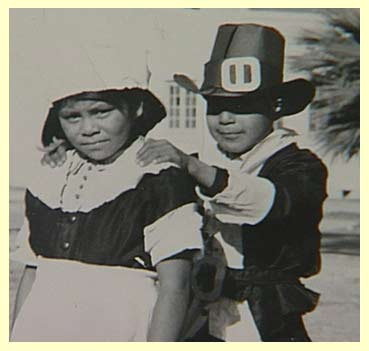 American Indian children dressed as Pilgrims |
[another Pilgrim text representing "the First Thanksgiving"]
from A
Journal of the Pilgrims at Plymouth (Mourt's Relation) E
(Mourt's Relation is a collection of anonymous writings by Pilgrims and Puritans concerning the early years (1620s-30s) of their settlements in New England.)
(from Edward Winslow's letter of 11 Dec. 1621 to a friend in England)
82 Our harvest being gotten in, our governor sent four men on fowling, that so we might after a special manner rejoice together after we had gathered the fruit of our labors. They four in one day killed as much fowl as, with a little help beside, served the company almost a week. At which time, amongst other recreations, we exercised our arms, many of the Indians coming amongst us, and among the rest their greatest king Massasoit, with some ninety men, whom for three days we entertained and feasted, and they went out and killed five deer, which they brought to the plantation and bestowed on our governor, and upon the captain and others. And although is be not always so plentiful as it was at this time with us, yet by the goodness of God, we are so far from want that we often wish you [English reader(s)] partakers of our plenty.
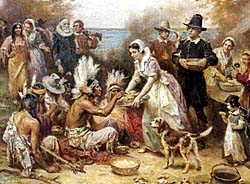
[The Pilgrims and other Puritans associating “gaming and reveling” on Christmas day with the old English Church, and so treated December 25th as just another work day.]
[¶12.15] Only I shall remember one passage more, rather of mirth [humor] then of weight [seriousness]. On the day called Christmas day, the Governor [i.e., Bradford himself] called them out to work, (as was usual,) but the most of this new company excused themselves and said it went against their consciences to work on that day. So the Governor told them that if they made it matter of conscience, he would spare them till they were better informed.
[¶12.16] So he led away the rest and left them; but when they [the workers] came home at noon from their work, he [Governor] found them [the others] in the street at play, openly; some pitching the bar and some at stool-ball, and such like sports. So he went to them, and took away their implements, and told them that was against his conscience, that they should play and others work. If they made the keeping of it matter of devotion, let them keep their houses, but there should be no gaming or reveling in the streets. Since which time nothing hath been attempted that way, at least openly.
![]()
|
Of Plymouth Plantation
from Chapter Fourteen. [Socialist
Commonwealth or |
Idealized New England Farm |
Instructor’s notes:
![]() This chapter shows the Pilgrims, like most American immigrants, giving up community or socialist
economics in favor of the profit motive and private ownership of
individualistic capitalism.
This chapter shows the Pilgrims, like most American immigrants, giving up community or socialist
economics in favor of the profit motive and private ownership of
individualistic capitalism.
![]() The
passage is challenging to read because Bradford reverses the
sequence of events, starting with the outcome where it's every man for himself,
then backing up to relate the failed experiment with a commonwealth.
The
passage is challenging to read because Bradford reverses the
sequence of events, starting with the outcome where it's every man for himself,
then backing up to relate the failed experiment with a commonwealth.
![]() Note Bradford’s knowledge of Plato’s Republic and other utopian
literature outside the biblical traditions, somewhat typical of the
Christian Humanism of the
Renaissance and early Reformation.
Note Bradford’s knowledge of Plato’s Republic and other utopian
literature outside the biblical traditions, somewhat typical of the
Christian Humanism of the
Renaissance and early Reformation.
![]()
[¶14.1] All this while no supply [of relief from England] was heard of, neither knew they when they might expect any. So they began to think how they might raise as much corn as they could, and obtain a better crop then they had done, that they might not still thus languish in misery. At length, after much debate of things, the Governor (with the advice of the chiefest amongst them) gave way that they should set corn every man for his own particular [each person or family with their own plot of land], and in that regard trust to themselves; in all other things to go on in the general way as before. And so assigned to every family a parcel of land, according to the proportion of their number for that end, only for present use (but made no division for inheritance), and ranged all boys and youth under some family.
[¶14.2] This had very good success; for it made all hands very industrious, so as much more corn was planted than other ways would have been by any means the Governor or any other could use, and saved him a great deal of trouble, and gave far better content. The women now went willingly into the field, and took their litle-ones with them to set corn, which before would allege weakness, and inability; whom to have compelled would have been thought great tyranny and oppression.
[¶14.3] The experience that was had in this common course and condition, tried sundry [several] years, and that amongst godly and sober men, may well evince the vanity of that conceit of Plato’s and other ancients, applauded by some of after [modern] times;—that the taking away of property, and bringing in communities into a commonwealth, would make them happy and flourishing; as if they were wiser then God. For this community (so far as it was) was found to breed much confusion and discontent, and retard much employment that would have been to their benefit and comfort.
[¶14.4] For the young men that were most able and fit for labor and service did repine [whine, complain] that they should spend their time and strength to work for other men’s wives and children, with out any recompense. The strong, or man of parts, had no more in division of victuals and clothes, then he that was weak and not able to doe a quarter the other could; this was thought injustice. The aged and graver men to be ranked and equalized in labors, and victuals, clothes, etc., with the meaner and younger sort, thought it some indignity and disrespect unto them.
[¶14.5] And for men’s wives to be commanded to do service for other men, as dressing their meat, washing their clothes, etc., they deemed it a kind of slavery, neither could many husbands well brook [stand] it. Upon the point all being to have alike, and all to do alike, they thought themselves in the like condition, and one as good as another; and so [equal in opportunity, that is, not in outcomes], if it did not cut off those relations that God hath set amongst men, yet it did at least much diminish and take off the mutual respects that should be preserved amongst them. And would have been worse if they had been men of another condition.
[¶14.6] Let none object this is men’s corruption, and nothing to the course itself. I answer, seeing all men have this corruption in them, God in his wisdom saw another course fitter for them. [This conclusion not to resist nature anticipates later American ideologies in the Declaration of Independence and elsewhere, and also development of capitalism as Social Darwinism or survival of fittest.]
![]()
Instructor's note: compare the Pilgrims' communal experiment with the New Testament model in the Book of Acts, chapter 2: 42, 44, and 45:
42 And they continued steadfastly in the apostles' doctrine and in fellowship ... 44 And all that believed were together, and had all things in common; 45 And sold their possessions and goods, and parted them to all men, as every man had need.
Acts 42: 32 And the multitude of them that believed were of one heart and of one soul: neither said any of them that ought of the things which he possessed was his own; but they had all things common. 33 And with great power gave the apostles witness of the resurrection of the Lord Jesus: and great grace was upon them all. 34 Neither was there any among them that lacked: for as many as were possessors of lands or houses sold them, and brought the prices of the things that were sold, 35 And laid them down at the apostles' feet: and distribution was made unto every man according as he had need. 36 And Joses, who by the apostles was surnamed Barnabas, (which is, being interpreted, The son of consolation,) a Levite, and of the country of Cyprus, 37 Having land, sold it, and brought the money, and laid it at the apostles' feet. (King James Version)
![]()
|
Of Plymouth Plantation
from Chapter 23.
["no longer any holding them together"] |
|
Instructor’s notes: The Pilgrims came to America for religious freedom, but soon another reason for immigration overwhelms their story. People become hungry for more wealth, which requires them to move from their original community's small world and separate from each other and their original mission. The result is a long-term, potentially tragic version of the immigrant narrative: immigrants come to America to hold their family together and maintain their values, but then their children and grandchildren want to keep moving and changing.
![]()
[¶23.1] Also the people of the plantation began to grow in their outward estates [material wealth], by reason of the flowing of many people into the country, especially into the Bay of the Massachusetts [the Boston area, receiving the “Great Migration” of Puritans in the 1630s & 40s]; by which means corn and cattle rose to a great price, by which many were much enriched, and commodities [elements of wealth] grew plentiful; and yet in other regards this benefit turned to their hurt, and this accession [gaining] of strength to their weakness.
[¶23.2] For now as their stocks increased, and the increase vendible, there was no longer any holding them together, but now they must of necessity go to their great lots; they could not other wise keep their cattle; and having oxen grown, they must have land for plowing and tillage. And no man now thought he could live, except he had cattle and a great deal of ground to keep them; all striving to increase their stocks.
[¶23.3] By which means they [the Pilgrims who lived together at Plymouth] were scattered all over the bay, quickly, and the town [Plymouth], in which they lived compactly [close together] till now, was left very thin, and in a short time almost desolate.
[¶23.4] And if this had been all, it had been less, though too much; but the church must also be divided, and those that had lived so long together in Christian and comfortable fellowship must now part and suffer many divisions. First, those that lived on their lots on the other side of the bay (called Duxbury) they could not long bring their wives and children to the public worship and church meetings here, but with such burden, as, growing to some competent number, they sued to be dismissed and become a body of themselves; and so they were dismissed (about this time), though very unwillingly.
[¶23.5] But to touch this sad matter, and handle things together that fell out afterward. To prevent any further scattering from this place, and weakening of the same, it was thought best to give out some good farms to special persons, that would promise to live at Plymouth, and likely to be helpful to the church or commonwealth, and so tie the lands to Plymouth as farms for the same; and there they might keep their cattle and tillage by some servants, and retain their dwellings here. And so some special lands were granted at a place general called Greens Harbor, where no allotments had been in the former division, a place very well meadowed, and fit to keep and rear cattle good store.
[¶23.6] But alas! this remedy proved worse then the disease; for within a few years those that had thus got footing there rent [tore] themselves away, partly by force, and partly wearying the rest with importunities and pleas of necessity, so as they must either suffer them to go, or live in continual opposition and contention. And others still, as they conceived themselves straitened, or to want accommodation, broke away under one pretence or other, thinking their own conceived necessity and the example of others a warrant sufficient for them. And this, I fear, will be the ruin of New England, at least of the churches of God there, and will provoke the Lord’s displeasure against them. [apocalyptic vision of judgment, vision of America in decline rather than progress.]
|
Of Plymouth Plantation
from Chapter Twenty-Eight. [The
Pequot War] |
|
[Instructor’s note: The Pequot Indians, like the Narragansetts, escaped the epidemic of 1616-19, but in 1633 a new outbreak of European diseases killed up to 80% of their population. Desperate at their losses and the growth of English settlements, the Pequots made a final great effort to drive away the English, who allied with the Narragansetts and Mohegans, the Pequots’ traditional enemies.]
![]()
Anno Dom: 1637.
[¶28.1] In the fore part of this year [1637], the Pequots [nearby Indian tribe] fell openly upon the English at Connecticut, in the lower parts of the river, and slew sundry of them, (as they were at work in the fields,) both men and women, to the great terror of the rest; and went away in great pride and triumph, with many high threats. They also assaulted a fort at the river’s mouth, though strong and well defended; and though they did not there prevail, yet it struck them [the English] with much fear and astonishment to see their bold attempts in the face of danger; which made them in all places to stand upon their guard, and to prepare for resistance, and earnestly to solicit their friends and confederates in the Bay of Massachusetts to send them speedy aide, for they looked for more forcible assaults. Mr. Vane, being then Governor, wrote from their General Court to them here, to join with them in this war; to which they were cordially willing, but took opportunity to write to them about some former things, as well as present, considerable hereabout. The which will best appear in the Governor’s answer which he returned to the same, which I shall here inserte.
Sir: . . . withal we conceive that you look at the Pequots, and all other Indians, as a common enemy, who, though he may take occasion of the beginning of his rage, from some one part of the English, yet if he prevail, will surely pursue his advantage, to the rooting out of the whole nation. . . . [from John Winthrop, Boston]
[¶28.2] In the meantime, the Pequots, especially in the winter before, sought to make peace with the Narragansetts, and used very pernicious arguments to move them thereunto: as that the English were strangers and began to overspread their country, and would deprive them thereof in time, if they were suffered to grow and increase; and if the Narragansetts did assist the English to subdue them [the Pequots], they [the Narragansetts] did but make way for their own overthrow, for if they were rooted out, the English would soon take occasion to subjugate them; and if they would hearken to them, they [the Indians] should not need to fear the strength of the English; for they would not come to open battle with them, but fire their houses, kill their cattle, and lie in ambush for them as they went abroad upon their occasions; and all this they might easily do without any or little danger to themselves. The which course being held, they well saw the English could not long subsist, but they would either be starved with hunger, or be forced to forsake the country; with many the like things; insomuch that the Narragansetts were once wavering, and were half-minded to have made peace with them [the Pequots], and joined against the English.
[¶28.3] But again when they [the Narragansetts] considered, how much wrong they had received from the Pequot, and what an opportunity they now had by the help of the English to right themselves, revenge was so sweet unto them, as it prevailed above all the rest; so as they resolved to join with the English against them, and did. The Court here agreed forwith to send 50 men at their own charge; and with as much speed as possible they could, got them armed, and had made them ready under sufficient leaders, and provided a bark [boat] to carry them provisions and tend upon them for all occasions; but when they were ready to march (with a supply from the Bay) they had word to stay, for the enemy was as good as vanquished, and there would be no need. . . .
[¶28.4] So they [the English] went on, and so ordered their march, as the [Narragansett] Indians brought them [the English] to a fort of the [Pequot] enemies (in which most of their chief men were) before day. They approached the same with great silence, and surrounded it both with English and Indians, that they might not break out; and so assaulted them with great courage, shooting amongst them, and entered the fort with all speed; and those that first entered found sharp resistance from the enemy, who both shot at and grappled with them; others [of the English] ran into their houses, and brought out fire, and set them on fire, which soon took in their mats, and, standing close together, with the wind, all was quickly on a flame, and thereby more were burnt to death then was otherwise slain; it burnt their bowstrings, and made them unserviceable. Those that scaped [escaped] the fire were slain with the sword; some hewed to pieces, others run through with their rapiers [swords], so as they were quickly dispatched, and very few escaped.
[¶28.5] It was conceived they [the English] thus destroyed about 400 [of the Pequot Indianss] at this time. It was a fearful sight to see them thus frying in the fire, and the streams of blood quenching the same, and horrible was the stink and scent thereof; but the victory seemed a sweet sacrifice, and they gave the praise thereof to God, who had wrought so wonderfully for them, thus to enclose their enemies in their hands, and give them so speedy a victory over so proud and insulting an enemy. . . .
![]()
|
Of Plymouth Plantation
from Chapter 33. ["Thus was this poor church left . . . "; compare ch. 23 above.] |
|
[¶33.1] I cannot but here take occasion, not only to mention, but greatly to admire the marvelous providence of God, that notwithstanding the many changes and hardships that these people went through, and the many enemies they had and difficulties they met withal, that so many of them should live to very old age! It was not only this reverend man’s condition [referring to the death of Elder John Brewster at 80], (for one swallow makes no summer, as they say,) but many more of them did the like, some dying about and before this time, and many still living, who attained to 60 years of age, and to 65 diverse to 70 and above, and some near 80 as he did.
[¶33.2] It must needs be more than ordinary, and above natural reason, that so it should be; for it is found in experience, that change of air, famine or unwholesome food, much drinking of water, sorrows and troubles, etc., all of them are enemies to health, causes of many diseases, consumers of natural vigor and the bodies of men, and shorteners of life. And yet of all these things they [the Pilgrims] had a large part, and suffered deeply in the same. They went from England to Holland, where they found both worse air and diet then that they came from; from thence (enduring a long imprisonment, as it were, in the ships at sea) into New England; and how it hath been with them here hath already been shown; and what crosses, troubles, fears, wants, and sorrows they had been liable unto, is easy to conjecture; so as in some sort they may say with the Apostle, 2. Corinthians 11.26, 27.
they were in journeyings often, in perils of waters, in perils of robbers, in perils of their own nation, in perils among the heathen, in perils in the wilderness, in perils in the sea, in perils among false brethren; in weariness and painfulness, in watching often, in hunger and thirst, in fasting often, in could and nakedness.
[¶33.3] What was it then that upheld them? It was God’s visitation that preserved their spirits.
Job 10.12. Thou hast given me life and grace, and thy visitation hath preserved my spirit. He that upheld the Apostle upheld them. They were persecuted, but not forsaken, cast down, but perished not. 2nd Corinthians 4. 9. As unknown, and yet known; as dying, and behold we live; as chastened, and yet not killed. 2nd Corinthians 6. 9.
[¶33.4] God, it seems, would have all men to behold and observe such mercies and works of his providence as these are towards his people, that they in like cases might be encouraged to depend upon God in their trials, and also bless his name when they see his goodness towards others. Man lives not by bread only, Deuteronomy 8.3.
[¶33.5] It is not by good and dainty fare, by peace, and rest, and heart’s ease, in enjoying the contentments and good things of this world only, that preserves health and prolongs life. (God in such examples would have the world see and behold that he can do it without them; and if the world will shut their eyes, and take no notice thereof, yet he would have his people to see and consider it.) . . .
Anno Dom: 1644
[¶33.6] Many having left this place (as is before noted) by reason of the straitness [limitations] and barrenness of the same, and their finding of better accommodations elsewhere, more suitable to their ends and minds; and sundry others still upon every occasion desiring their dismissions, the church began seriously to think whether it were not better jointly to remove to some other place, than to be thus weakened, and as it were insensibly dissolved.
[¶33.7] Many meetings and much consultation was held hereabout, and diverse were men’s minds and opinions. Some were still for staying together in this place, alleging men might here live, if they would be content with their condition; and that it was not for want or necessity so much that they removed, as for the enriching of themselves. Others were resolute upon removal, and so signified that here they could not stay; but if the church did not remove, they must; insomuch as many were swayed, rather than there should be a dissolution, to condescend to a removal, if a fit place could be found, that might more conveniently and comfortablie receive the whole, with such accession of others as might come to them, for their better strength and subsistence; and some such-like cautions and limitations.
[¶33.8] So as, with the aforesaid provisos, the greater part consented to a removal to a place called Nawsett, which had been superficially viewed and the good will of the purchasers (to whom it belonged) obtained, with some addition thereto from the Court. But now they began to see their error, that they had given away already the best and most commodious [comfortable] places to others, and now wanted themselves; for this place was about 50. miles from hence, and at an outside of the country, remote from all Society; also, that it would prove so strait [limiting], as it would not be competent to receive the whole body, much less be capable of any addition or increase; so as (at least in a short time) they should be worse there then they are now here. The which, with sundry other like considerations and inconveniences, made them change their resolutions; but such as were before resolved upon removal took advantage of this agreement, and went on notwithstanding, neither could the rest hinder them, they having made some beginning.
[¶33.9] And thus was this poor church left, like an ancient mother, grown old, and forsaken of her children, (though not in their affections,) yet in regard of their bodily presence and personal helpfulness. Her ancient members being most of them worn away by death; and these of later time being like children translated into other families, and she like a widow left only to trust in God [1 Timothy 5.5]. Thus she that had made many rich became herself poor [2 Corinthians 6.10].
[1 Timothy 5:5 (KJV) Now she that is a widow indeed, and desolate, trusteth in God, and continueth in supplications and prayers night and day.
2 Corinthians 6:10 (KJV) As sorrowful, yet alway rejoicing; as poor, yet making many rich; as having nothing, and yet possessing all things.]
